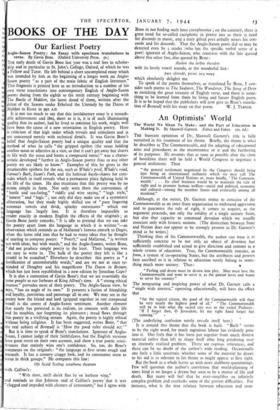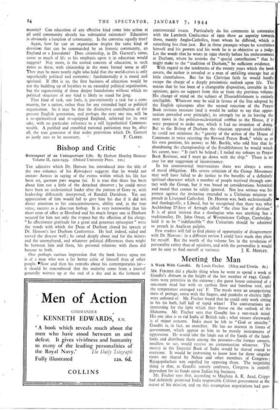The World We Mean To Make : and the Part
of Education in Making It. By Maxwell Garnett. (Faber and Faber. los. 6d.)
An Optimists' World
THE buoyant optimism of Dr., Maxwell Garnett's title is fully sustained in his treatment of his theme. Briefly, the theme is what he describes as The Commonwealth, and the adapting of educational aims and procedures to the maintenance of it and the furthering of its purposes. He assumes that as soon as possible after the close of hostilities there will be held a World Congress to negotiate a general settlement. Then " the general settlement negotiated by the Congress should bring into being an international authority which we may call The Commonwealth of United Nations or, more briefly, The Common- wealth.' . . . Its chief business would be to maintain the rule of right and to promote human welfare—social and political, economic and cultural—among the member States and eventually among all mankind."
Although, at the outset, Dr. Garnett seems to conceive of the Commonwealth as an inter-State organisation to withstand aggression and to guarantee the rule of right, it comes to acquire, as the argument proceeds, not only the solidity of a single unitary State, but also that capacity to command devotion which we usually associate only with historic nations. (The distinction between State and Nation does not appear to be strongly present to Dr. Garnett's mind as he writes.)
Thinking thus of his Commonwealth, the author can treat it as sufficiently concrete to be not only an object of devotion but sufficiently established and actual to give direction and content to a whole system of education. True, the Commonwealth remains, in form, a system of co-operating States, but the attributes and powers here ascribed to it in relation to education surely belong to some- thing much more unitary. Thus: •
" Feeling and desire must be drawn into play. Men must love the Commonwealth and want to serve it, as the patriot loves and wants to serve his country."
The integrating and inspiring power of what Dr. Garnett calls a " single wide interest," operating educationally, will have the effect that (The underlying confusion surely reveals itself here.)
It is around this theme that the book is built. " Built " seems to be the right word, for much ingenious labour has evidently gone into it. One feels that it has been put together from much diverse material rather than left to shape itself after long pondering over an intensely realised problem. There are copious references, and there can be no doubt of the author's wide reading. Occasionally one feels a little uncertain whether some of the material he draws to his aid is as relevant to his theme as might appear at first sight.
But the book as a whole leaves us with more stubborn questionings. Few will question the author's conviction that world-planning of some kind is no longer a dream but soon to be a matter of life and death. But many will feel that he over-simplifies an infinitely complex problem and overlooks some of the gravest difficulties. For instance, what is the true relation between education and com- " for the typical citizen, the good of the Commonwealth will then be very nearly the highest good of all." " The Commonwealth will be to him what the sacred city was to the exiled Psalmist: If I forget thee, 0 Jerusalem, let my right hand forget her
cunning. . • munity? Can education of any effective kind come into action at all until community already has substantial existence? Education is obviously a function of community. Is the converse equally true?
Again, how far can an organisation inspire the same kind of devotion that can be commanded by an historic community, an England or a Jerusalem? Does citizenship, in Dr. Garnett's sense, cover as much of life as his emphasis upon it in education would suggest? Nay more, is the central concern of education, in such times as these, with citizenship in the more formal sense at all? They may be more nearly right who hold that the world-crisis is only superficially political and economic: fundamentally it is moral and spiritual. If that is so, the first business of education would be not the building up of loyalties to an extended political organisation, but the regenerating of those deeper foundations without which no political structure of any kind is likely to stand for long..
That kind of task, one feels, is pre-eminently a task for a com- munity, for a nation, rather than for any extended legal or political organisation. So it may be that the distinctive contribution of the present English generation, and perhaps the next one too, will be a re-spiritualised and re-equipped England, achieved for its own' sake, with no particular reference to a still hypothetical Common- wealth. A purified and ennobled national patriotism may be, after all, the true generator of that wider patriotism which Dr. Garnett























 Previous page
Previous page